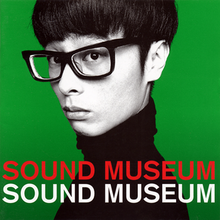1997 studio album by Towa Tei
Sound Museum is the second studio album by Japanese music producer Towa Tei, released on May 25, 1997, by East West Records. Collaborators on the album include Kylie Minogue, Biz Markie, and Bebel Gilberto.[8]
Sound Museum peaked at number 17 on the Oricon Albums Chart.[9] By July 1997, it had sold over 100,000 copies.[10]
Notes
Sample credits[11]
- ^ Daley, David (August 1998). "Japan's Shibuya-Kei Scene Invades America". CMJ New Music Monthly. No. 60. pp. 16–17. Retrieved December 11, 2020.
- ^ "ハッピー | TOWA TEI" (in Japanese). Oricon. Retrieved December 11, 2020.
- ^ "Intro | TOWA TEI" (in Japanese). Oricon. Retrieved December 11, 2020.
- ^ Bush, John. "Sound Museum – Towa Tei". AllMusic. Retrieved August 3, 2015.
- ^ Hermes, Will (February 20, 1998). "Sound Museum". Entertainment Weekly. Retrieved June 24, 2018.
- ^ Wisdom, James P. "Towa Tei: Sound Museum". Pitchfork. Archived from the original on February 28, 2008. Retrieved November 10, 2007.
- ^ Sheffield, Rob (March 5, 1998). "Towa Tei: Sound Museum". Rolling Stone. Archived from the original on April 19, 2003. Retrieved June 24, 2018.
- ^ a b Flick, Larry (January 31, 1998). "3 Dancefloor Vets Are Back With Top-Notch Tunes". Billboard. Vol. 110, no. 5. pp. 44–45. Retrieved December 11, 2020.
- ^ a b c "サウンド・ミュージアム | TOWA TEI" (in Japanese). Oricon. Retrieved December 20, 2022.
- ^ McClure, Steve (July 19, 1997). "Label Loyalty Lost As 3 Japanese Acts Jump Ship". Billboard. Vol. 109, no. 29. p. 56. Retrieved November 11, 2017.
- ^ Sound Museum (liner notes). Towa Tei. East West Records. 1997. AMCY-2258~9.
{{cite AV media notes}}: CS1 maint: others in cite AV media (notes) (link) - ^ "Sound Museum : TOWA TEI" (in Japanese). HMV Japan. Retrieved August 3, 2015.
- ^ "Sound Museum – Towa Tei" (in German). Germany: Amazon. 1998. Retrieved August 3, 2015.
|
|---|
|
| Studio albums | |
|---|
| Remix albums | |
|---|
| Singles | |
|---|
| Related topics | |
|---|



 French
French Deutsch
Deutsch